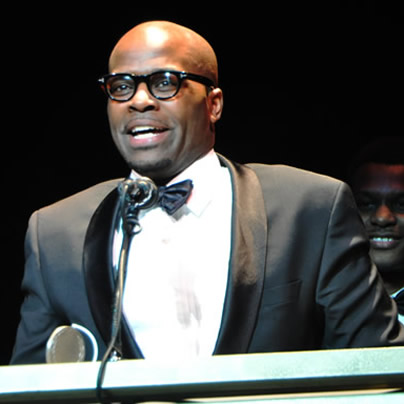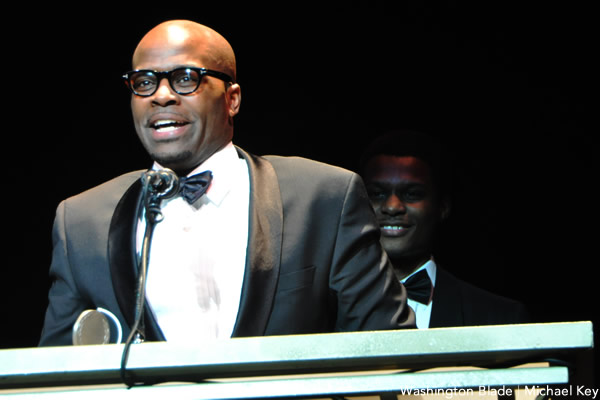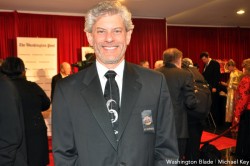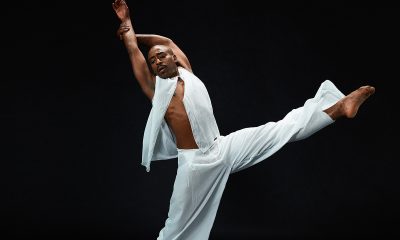Arts & Entertainment
Stage accolades
Out theater pros in several disciplines win big at Hayes Awards


Cedric Neal at the 2013 Helen Hayes Awards. (Washington Blade photo by Michael Key)
“I came to Signature [Theatre] to do ‘Dreamgirls’ and met my dream guy,” said an ecstatic Cedric Neal as he accepted the Helen Hayes Award for outstanding supporting actor in a resident musical for playing fallen music idol Jimmy Early in the company’s take on the Motown-inspired musical. Filled with love and gratitude, but not too serious, describe both Neal’s boyfriend-acknowledging speech and the mood of this year’s ceremony held Monday night at the Warner Theatre.
Presented by theatreWashington, the Helen Hayes Awards have been doled out annually to reward excellence in Washington-area professional theater since 1984. Throughout 2012, 54 theaters produced 201 (150 plays and 51 musicals) productions that met eligibility requirements in the January-through-December judging cycle. From these shows, a pool of 48 volunteer judges selected the evening’s nominees and winners.
Monday’s ceremony was hosted by the familiar mellifluous tones of unseen announcer Robert Aubry Davis and changing pairs of presenters including gay theater professionals like actor Frank Britton, set designer Tony Cisek, sassy choreographer Maurice Hines and young Helen Hayes Award-winning actor Matthew DeLorenzo. Throughout the evening, six top notch local artists (including Delorenzo and Joshua Morgan — also gay) performed musical numbers — cute original songs as well as familiar tunes picked from the five nominated resident musical productions.

Serge Seiden (Washington Blade photo by Michael Key)
The evening got off to a quick start with Serge Seiden, who is gay, receiving outstanding director for a resident musical for MetroStage’s “Jacques Brel Is Alive and Well and Living in Paris.”
Bobby Smith won outstanding actor in a resident musical for his brilliant work in “Brel.” “I’m sorry I didn’t wear my tux,” said Smith (also gay). He also joked about martinis and old age medications (though he’s hardly old) before getting serious and thanking MetoStage’s artistic director Carolyn Griffin for holding the title role for him while he recuperated from hip replacement surgery. Smith’s leading lady Natascia Diaz deservedly received outstanding actress for her gorgeous, heartfelt performance in “Brel,” winning a competitive category that included big-voiced Nova Y. Payton who memorably played Effie in Signature’s “Dreamgirls.”
But despite “Brel’s” big wins, in the end “Dreamgirls” took outstanding resident musical. And after not winning any of its many nominations, the Folger Theatre’s Wild West-set “The Taming of the Shrew” rather unexpectedly won outstanding resident play.
The most nominated musical of the night — Toby’s Dinner Theatre’s “The Color Purple” — took home just one award: Theresa Cunningham won outstanding supporting actress in a resident musical. She thanked Toby’s for the role and for teaching her the challenges of waiting tables. Before leaving the stage, she urged audience members to always tip well. Cunningham tied with Priscilla Cuellar for her work in Toby’s “Legally Blonde.” The dinner theater’s rowdy supporters ensured that these two recipients received the loudest and longest applause of the evening.
Young New York-based playwright Paul Downs Colaizzo, a big proponent of same-sex marriage, won outstanding new work for “Really, Really,” his play about the selfish ways of young people. Colaizzo wasn’t on hand to pick up his award.
Victor Shargai, theatreWashington’s chairman, along with talented local actor Naomi Jacobson (whom Shargai said makes him laugh, cry and sometimes consider changing his sexual orientation), presented the Helen Hayes Tribute to Actors’ Equity Association (AEA) on the occasion of its 100th anniversary. Typically, the tribute has been awarded to big theater names like Tommy Tune, Edward Albee and Jerry Herman in recognition of exceptional achievement, but this year was different. Accepting on behalf of the actors’ union were AEA President Nicholas Wyman and Oscar-winning movie star and longtime AEA member Ellen Burstyn.
The John Aniello Award for Outstanding Emerging Theatre Company (named for Shargai’s late partner, an avid supporter of D.C. theater) went to Dizzy Miss Lizzie’s Roadside Revue, a terrific rock/vaudeville infused musical troupe. Capital Fringe, D.C.’s amazing unjuried, self-producing, open access arts festival received the Washington Post Award for innovative leadership.
Awards are great, but it’s the ongoing work that really makes the D.C. theater community hum. So, like Monday’s event reiterated in word and lyric — “go see a show!”
A complete list of winners is here.

Friday, Feb. 20
Center Aging Monthly Luncheon with Yoga will be at noon at the D.C. LGBTQ+ Community Center. Email Mac at [email protected] if you require ASL interpreter assistance, have any dietary restrictions, or questions about this event.
Trans and Genderqueer Game Night will be at 7 p.m. at the D.C. Center. This will be a relaxing, laid-back evening of games and fun. All are welcome! We’ll have card and board games on hand. Feel free to bring your own games to share. For more details, visit the Center’s website.
Go Gay DC will host “First Friday LGBTQ+ Community Social” at 7 p.m. at Hotel Zena. This is a chance to relax, make new friends, and enjoy happy hour specials at this classic retro venue. Attendance is free and more details are available on Eventbrite.
Saturday, Feb. 21
Go Gay DC will host “LGBTQ+ Community Brunch” at 11 a.m. at Freddie’s Beach Bar & Restaurant. This fun weekly event brings the DMV area LGBTQ community, including allies, together for delicious food and conversation. Attendance is free and more details are available on Eventbrite.
LGBTQ People of Color will be at 7 p.m. on Zoom. This peer support group is an outlet for LGBTQ People of Color to come together and talk about anything affecting them in a space that strives to be safe and judgement free. There are all sorts of activities like watching movies, poetry events, storytelling, and just hanging out with others. For more information and events, visit thedccenter.org/poc or facebook.com/centerpoc.
Sunday, Feb. 22
Queer Talk DC will host “The Black Gay Flea Market” at 1 p.m. at Doubles in Petworth. There will be more than 15 Black queer vendors from all over the DMV in one spot. The event’s organizers have reserved the large back patio for all vendors, and the speak easy for bar service, which will be serving curated cocktails made just for the event (cash bar.) DJ Fay and DJ Jam 2x will be spinning the entire event. For more details, visit Eventbrite.
Monday, Feb. 23
“Center Aging: Monday Coffee Klatch” will be at 10 a.m. on Zoom. This is a social hour for older LGBTQ adults. Guests are encouraged to bring a beverage of choice. For more information, contact Adam at [email protected].
Tuesday, Feb. 24
Coming Out Discussion Group will be at 7 p.m. on Zoom. This is a safe space to share experiences about coming out and discuss topics as it relates to doing so — by sharing struggles and victories the group allows those newly coming out and who have been out for a while to learn from others. For more details, visit the group’s Facebook.
Genderqueer DC will be at 7 p.m. on Zoom. This is a support group for people who identify outside of the gender binary, whether you’re bigender, agender, genderfluid, or just know that you’re not 100 percent cis. For more details, visit genderqueerdc.org or Facebook.
Wednesday, Feb. 25
Job Club will be at 6 p.m. on Zoom upon request. This is a weekly job support program to help job entrants and seekers, including the long-term unemployed, improve self-confidence, motivation, resilience and productivity for effective job searches and networking — allowing participants to move away from being merely “applicants” toward being “candidates.” For more information, email [email protected] or visit thedccenter.org/careers.
Asexual and Aromantic Group will meet at 7 p.m. on Zoom. This is a space where people who are questioning this aspect of their identity or those who identify as asexual and/or aromantic can come together, share stories and experiences, and discuss various topics. For more details, email [email protected].
Thursday, Feb. 26
The DC Center’s Fresh Produce Program will be held all day at the DC Center. To be more fair with who is receiving boxes, the program is moving to a lottery system. People will be informed on Wednesday at 5 p.m. if they are picked to receive a produce box. No proof of residency or income is required. For more information, email [email protected] or call 202-682-2245.
Virtual Yoga Class will be at 7 p.m. on Zoom. This free weekly class is a combination of yoga, breathwork and meditation that allows LGBTQ community members to continue their healing journey with somatic and mindfulness practices. For more details, visit the DC Center’s website.
Sports
US wins Olympic gold medal in women’s hockey
Team captain Hilary Knight proposed to girlfriend on Wednesday

The U.S. women’s hockey team on Thursday won a gold medal at the Milan Cortina Winter Olympics.
Team USA defeated Canada 2-1 in overtime. The game took place a day after Team USA captain Hilary Knight proposed to her girlfriend, Brittany Bowe, an Olympic speed skater.
Cayla Barnes and Alex Carpenter — Knight’s teammates — are also LGBTQ. They are among the more than 40 openly LGBTQ athletes who are competing in the games.
The Olympics will end on Sunday.
Movies
Radical reframing highlights the ‘Wuthering’ highs and lows of a classic
Emerald Fennell’s cinematic vision elicits strong reactions

If you’re a fan of “Wuthering Heights” — Emily Brontë’s oft-filmed 1847 novel about a doomed romance on the Yorkshire moors — it’s a given you’re going to have opinions about any new adaptation that comes along, but in the case of filmmaker Emerald Fennell’s new cinematic vision of this venerable classic, they’re probably going to be strong ones.
It’s nothing new, really. Brontë’s book has elicited controversy since its first publication, when it sparked outrage among Victorian readers over its tragic tale of thwarted lovers locked into an obsessive quest for revenge against each other, and has continued to shock generations of readers with its depictions of emotional cruelty and violent abuse, its dysfunctional relationships, and its grim portrait of a deeply-embedded class structure which perpetuates misery at every level of the social hierarchy.
It’s no wonder, then, that Fennell’s adaptation — a true “fangirl” appreciation project distinguished by the radical sensibilities which the third-time director brings to the mix — has become a flash point for social commentators whose main exposure to the tale has been flavored by decades of watered-down, romanticized “reinventions,” almost all of which omit large portions of the novel to selectively shape what’s left into a period tearjerker about star-crossed love, often distancing themselves from the raw emotional core of the story by adhering to generic tropes of “gothic romance” and rarely doing justice to the complexity of its characters — or, for that matter, its author’s deeper intentions.
Fennell’s version doesn’t exactly break that pattern; she, too, elides much of the novel’s sprawling plot to focus on the twisted entanglement between Catherine Earnshaw (Margot Robbie), daughter of the now-impoverished master of the titular estate (Martin Clunes), and Heathcliff (Jacob Elordi), a lowborn child of unknown background origin that has been “adopted” by her father as a servant in the household. Both subjected to the whims of the elder Earnshaw’s violent temper, they form a bond of mutual support in childhood which evolves, as they come of age, into something more; yet regardless of her feelings for him, Cathy — whose future status and security are at risk — chooses to marry Edgar Linton (Shazad Latif), the financially secure new owner of a neighboring estate. Heathcliff, devastated by her betrayal, leaves for parts unknown, only to return a few years later with a mysteriously-obtained fortune. Imposing himself into Cathy’s comfortable-but-joyless matrimony, he rekindles their now-forbidden passion and they become entwined in a torrid affair — even as he openly courts Linton’s naive ward Isabella (Alison Oliver) and plots to destroy the entire household from within. One might almost say that these two are the poster couple for the phrase “it’s complicated.” and it’s probably needless to say things don’t go well for anybody involved.
While there is more than enough material in “Wuthering Heights” that might easily be labeled as “problematic” in our contemporary judgments — like the fact that it’s a love story between two childhood friends, essentially raised as siblings, which becomes codependent and poisons every other relationship in their lives — the controversy over Fennell’s version has coalesced less around the content than her casting choices. When the project was announced, she drew criticism over the decision to cast Robbie (who also produced the film) opposite the younger Elordi. In the end, the casting works — though the age gap might be mildly distracting for some, both actors deliver superb performances, and the chemistry they exude soon renders it irrelevant.
Another controversy, however, is less easily dispelled. Though we never learn his true ethnic background, Brontë’s original text describes Heathcliff as having the appearance of “a dark-skinned gipsy” with “black fire” in his eyes; the character has typically been played by distinctly “Anglo” men, and consequently, many modern observers have expressed disappointment (and in some cases, full-blown outrage) over Fennel’s choice to use Elordi instead of putting an actor of color for the part, especially given the contemporary filter which she clearly chose for her interpretation for the novel.
In fact, it’s that modernized perspective — a view of history informed by social criticism, economic politics, feminist insight, and a sexual candor that would have shocked the prim Victorian readers of Brontë’s novel — that turns Fennell’s visually striking adaptation into more than just a comfortably romanticized period costume drama. From her very opening scene — a public hanging in the village where the death throes of the dangling body elicit lurid glee from the eagerly-gathered crowd — she makes it oppressively clear that the 18th-century was not a pleasant time to live; the brutality of the era is a primal force in her vision of the story, from the harrowing abuse that forges its lovers’ codependent bond, to the rigidly maintained class structure that compels even those in the higher echelons — especially women — into a kind of slavery to the system, to the inequities that fuel disloyalty among the vulnerable simply to preserve their own tenuous place in the hierarchy. It’s a battle for survival, if not of the fittest then of the most ruthless.
At the same time, she applies a distinctly 21st-century attitude of “sex-positivity” to evoke the appeal of carnality, not just for its own sake but as a taste of freedom; she even uses it to reframe Heathcliff’s cruel torment of Isabella by implying a consensual dom/sub relationship between them, offering a fragment of agency to a character typically relegated to the role of victim. Most crucially, of course, it permits Fennell to openly depict the sexuality of Cathy and Heathcliff as an experience of transgressive joy — albeit a tormented one — made perhaps even more irresistible (for them and for us) by the sense of rebellion that comes along with it.
Finally, while this “Wuthering Heights” may not have been the one to finally allow Heathcliff’s ambiguous racial identity to come to the forefront, Fennell does employ some “color-blind” casting — Latif is mixed-race (white and Pakistani) and Hong Chau, understated but profound in the crucial role of Nelly, Cathy’s longtime “paid companion,” is of Vietnamese descent — to illuminate the added pressures of being an “other” in a world weighted in favor of sameness.
Does all this contemporary hindsight into the fabric of Brontë’s epic novel make for a quintessential “Wuthering Heights?” Even allowing that such a thing were possible, probably not. While it presents a stylishly crafted and thrillingly cinematic take on this complex classic, richly enhanced by a superb and adventurous cast, it’s not likely to satisfy anyone looking for a faithful rendition, nor does it reveal a new angle from which the “romance” at its center looks anything other than toxic — indeed, it almost fetishizes the dysfunction. Even without the thorny debate around Heathcliff’s racial identity, there’s plenty here to prompt purists and revisionists alike to find fault with Fennell’s approach.
Yet for those looking for a new window into to this perennial classic, and who are comfortable with the radical flourish for which Fennell is already known, it’s an engrossing and intellectually stimulating exploration of this iconic story in a way that exchanges comfortable familiarity for unpredictable chaos — and for cinema fans, that’s more than enough reason to give “Wuthering Heights” a chance.
-

 European Union5 days ago
European Union5 days agoEuropean Parliament resolution backs ‘full recognition of trans women as women’
-

 Africa4 days ago
Africa4 days agoLGBTQ groups question US health agreements with African countries
-

 National4 days ago
National4 days agoTrump falsely links trans people to terrorism
-

 Virginia4 days ago
Virginia4 days agoFellow lawmakers praise Adam Ebbin after Va. Senate farewell address




















